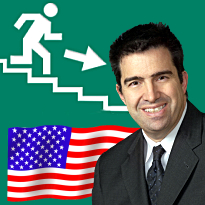 Prominent gaming industry lawyer Anthony Cabot is worried that a future US online poker market could produce a regulatory ‘race to the bottom.’ In an op-ed published on eGamingReview, Cabot imagines a US market in which more and more states get into the internet gambling game, some of which would need to establish gaming commissions on the fly, from scratch. Mo’ regulators equals mo’ ways in which rules can be interpreted, which Cabot feels could equal mo’ problems.
Prominent gaming industry lawyer Anthony Cabot is worried that a future US online poker market could produce a regulatory ‘race to the bottom.’ In an op-ed published on eGamingReview, Cabot imagines a US market in which more and more states get into the internet gambling game, some of which would need to establish gaming commissions on the fly, from scratch. Mo’ regulators equals mo’ ways in which rules can be interpreted, which Cabot feels could equal mo’ problems.
To illustrate his point, Cabot references (without naming names) the concerns voiced by New Jersey gaming regulators over their licensee MGM Resorts’ joint venture partnership with Pansy Ho in the MGM Grand Macau. The NJ regulators deemed Ho ‘unsuitable’ due to allegations that her father, Macau gaming icon Stanley Ho, had ties to organized crime. (Not being complete dummies, MGM ultimately chose to solve the problem by divesting its holdings in the Borgata hotel casino in Atlantic City.) Cabot’s point is that, while New Jersey had a Pansy problem, MGM’s regulators in Nevada didn’t appear to care about no Ho. Regulators in two different states looked at the same situation regarding a licensee: one saw a problem, one didn’t.
Applying the above scenario to the online poker world, Cabot suggests that some states could deliberately opt to interpret regulations less strictly than other states. For example, one state could choose not to make an issue of whether an online gambling company took bets from US citizens pre- or post-Unlawful Internet Gambling Enforcement Act (UIGEA). Others could offer looser interpretations of the word ‘scrutiny’ or charge operators less for the privilege of being scrutinized. This would create something of a buyer’s market for operators, ultimately resulting in the aforementioned regulatory ‘race to the bottom.’
Given that Cabot is based in Las Vegas, it’s perhaps not surprising that his opinion mirrors that of the American Gaming Association (AGA), the Nevada casino giants’ umbrella outfit. The AGA has predicted ‘confusion’ if states are allowed to launch online poker systems without federal oversight, although there are political barriers to the picture Cabot has painted, in particular, the willingness of authorities to overlook the whole UIGEA thing.
In contrast to Cabot’s position, Calvin Ayre has gone on record that the first states to go the intrastate online poker route will likely over-regulate, rather than the other way around. That said, if the US market ever matures to the point where these individual states start sharing liquidity across state lines, the late-to-the-party states might well feel the need to do something to attract new operators and/or lure them away from other states. (We’re trying real hard to avoid using a ‘fat chicks aim to please’ metaphor… oops, too late.) And really, given that over-regulation traditionally results in reduced competition and innovation, which ultimately results in decreased player value, would a nation of fat chicks really be so awful?